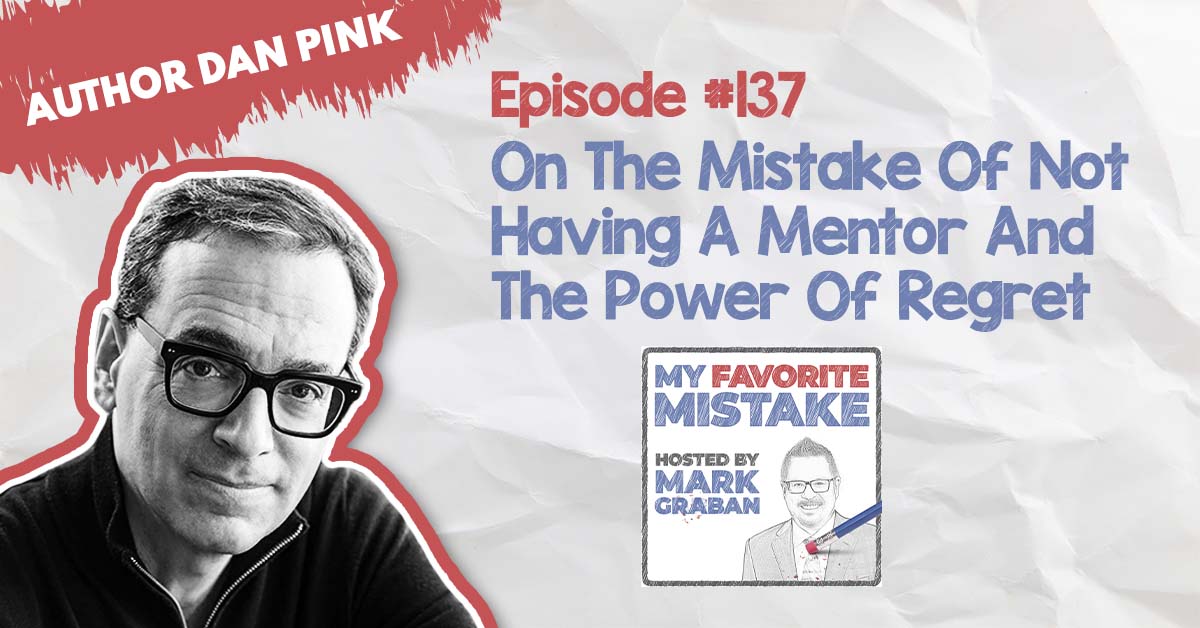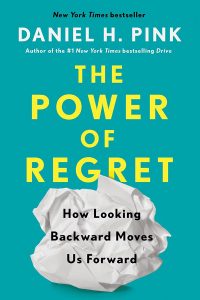Listen:
Check out all episodes on the My Favorite Mistake main page.
My guest for Episode #137 of the My Favorite Mistake podcast is Daniel H. Pink. He is the author of seven books and his most recent was released on February 1, The Power of Regret: How Looking Backward Moves Us Forward – that seems like a perfect topic to explore on this podcast.
I had a chance to interview Dan back in 2010, for another podcast series, about his book Drive: The Surprising Truth About What Motivates Us.
Dan’s books have won multiple awards, have been translated into 42 languages, and have sold millions of copies around the world. He received a BA from Northwestern University, where he was a Truman Scholar and was elected to Phi Beta Kappa, and a JD from Yale Law School.
In today's episode, Dan shares his “favorite mistake” story about never finding a mentor — he didn't ask, didn't think it was needed. How did he learn that this was a mistake and a regret?
Questions and Topics:
- What's the difference or connection between mistakes and regrets?
- Mistake is an action, regret is an emotion
- Why having regrets is normal and healthy — and “why the ‘No Regrets' philosophy is dunderheaded and dangerous”
- You uncovered the four most common regrets, what’s one example?
- Is “regret” our most misunderstood emotion?
- Why do we regret what we DON’T DO more than regretting what we DO do?
- I regret times when I didn’t speak up in the moment…
- Tell us about the research that went into this book…
- “Talking about the regret is helpful” – lifts the burden, words out loud help or writing (disclosure)
- Self-compassion. Kristen Neff (Texas)
- How can we turn regrets into a positive force?
- How can we avoid dwelling in regret?
- Do you think the pandemic has, in some way, caused people to think differently about regret?
- World Regret Survey
Find Dan on Social Media:
Watch the Full Episode:
Quotes:
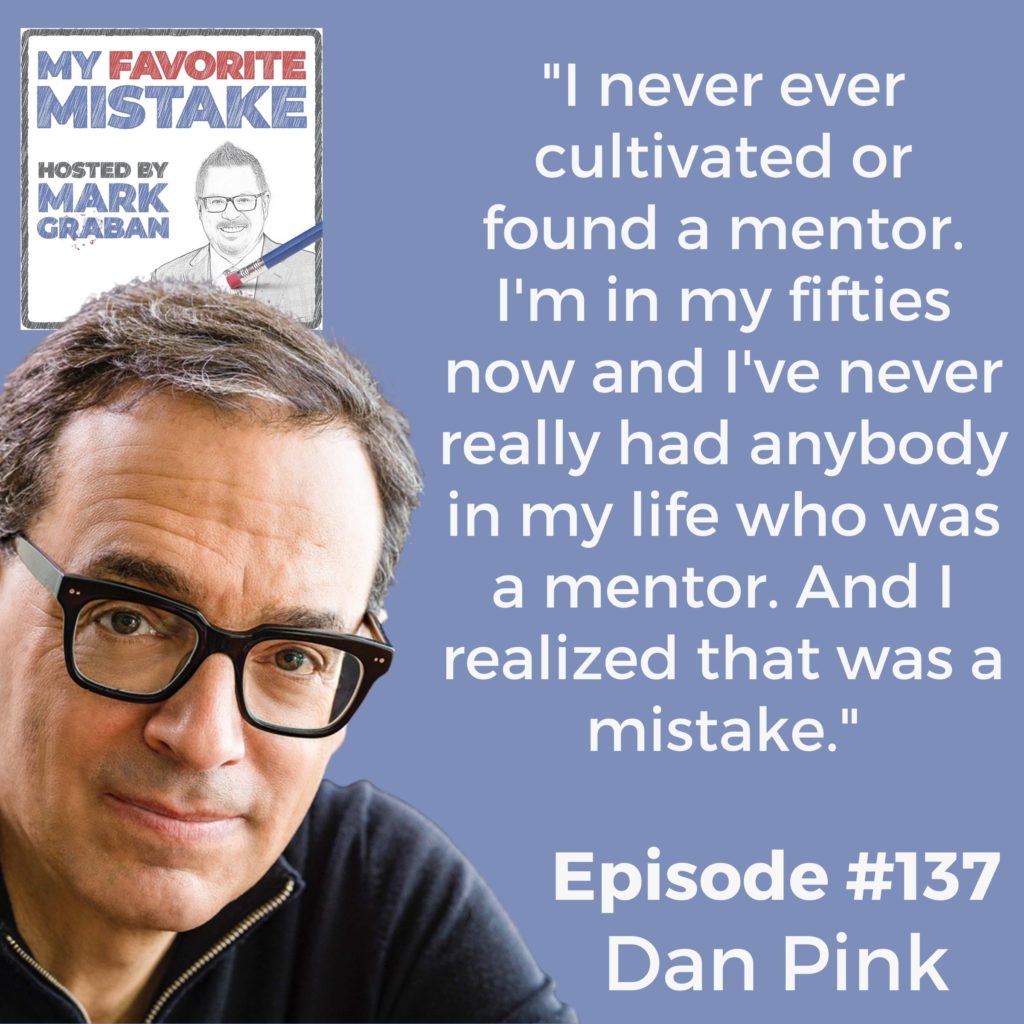
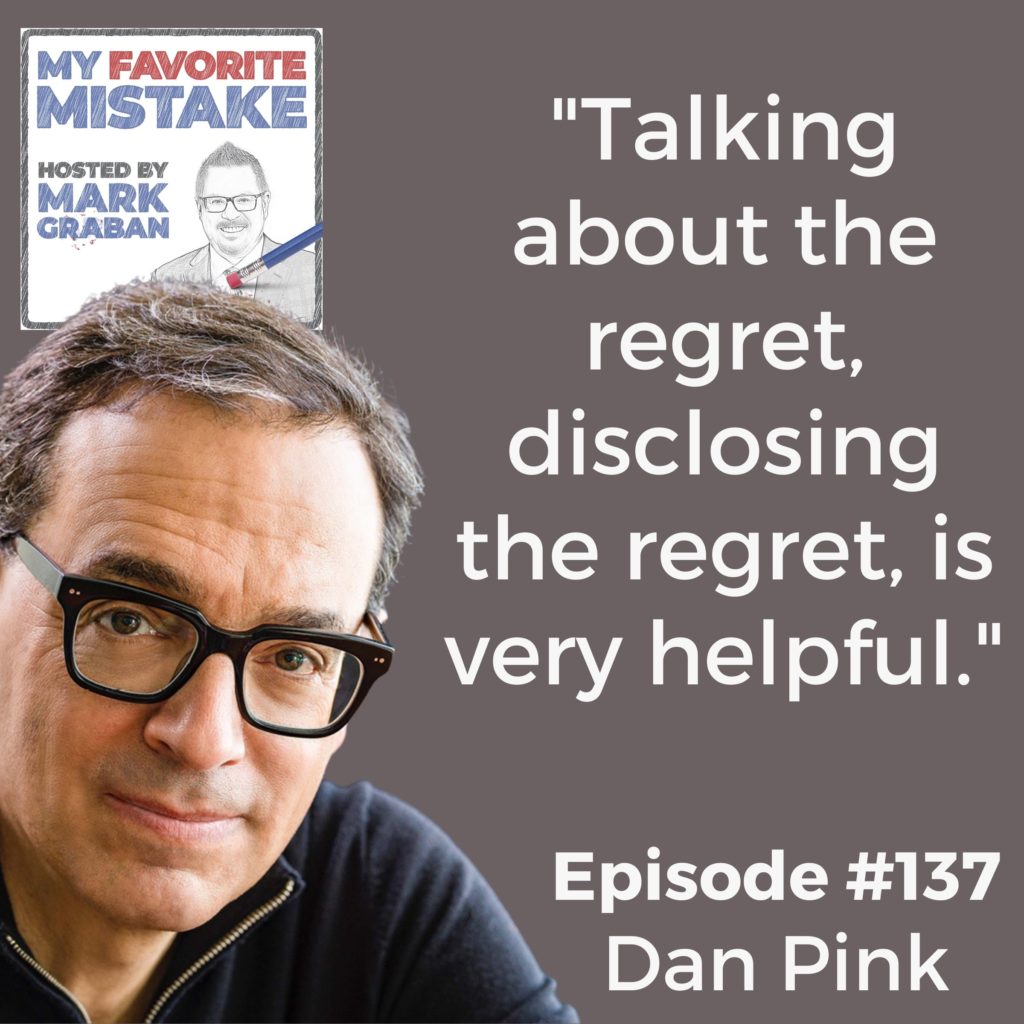
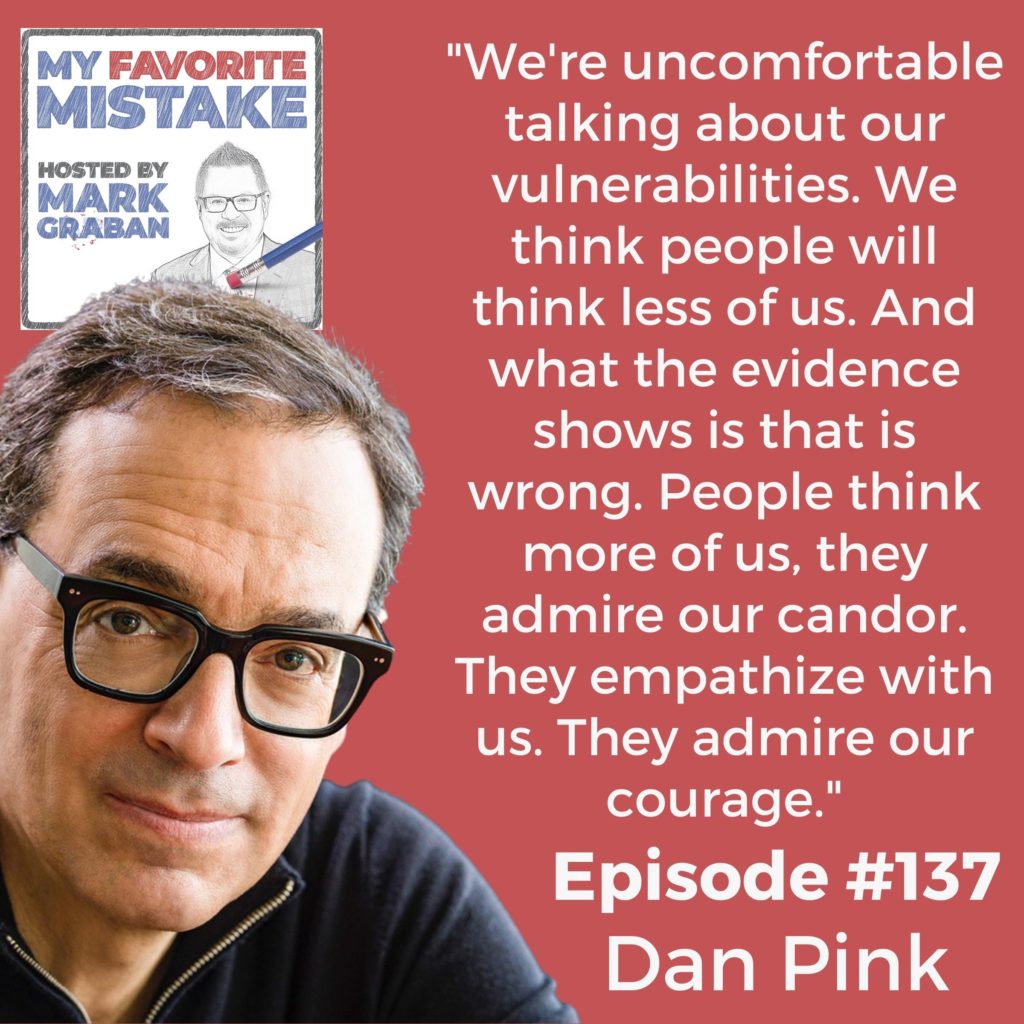
Subscribe, Follow, Support, Rate, and Review!
Please follow, rate, and review via Apple Podcasts or Podchaser or your favorite app — that helps others find this content and you'll be sure to get future episodes as they are released weekly. You can also become a financial supporter of the show through Anchor.fm.
You can now sign up to get new episodes via email, to make sure you don't miss an episode.
This podcast is part of the Lean Communicators network.

Other Ways to Subscribe or Follow — Apps & Email
Author Dan Pink On The Mistake Of Not Having A Mentor And The Power Of Regret
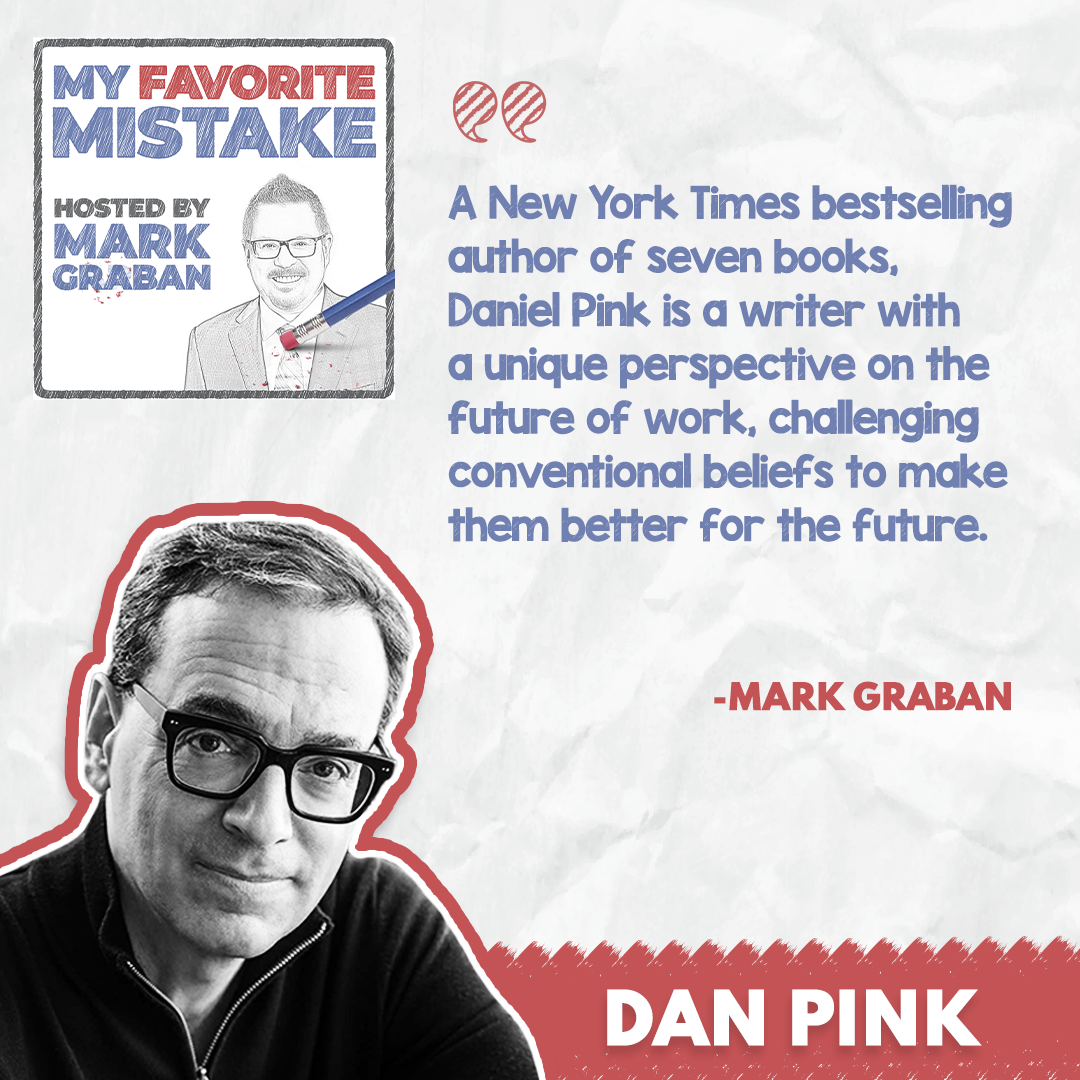
I'm excited to have Dan Pink as our guest. He is a New York Times bestselling author. I had a chance to interview Dan back in 2010 in a different series about his book, Drive: The Surprising Truth About What Motivates Us. He has a new book. We're going to talk about that and other things. Before I tell you more, Dan, thank you for being here. How are you?
Mark, it's always a pleasure.
I'm thrilled. Congratulations in advance on the book. This is the seventh book and the most recent which was released on February 1st. It is The Power of Regret: How Looking Backward Moves Us Forward. That seems like a perfect topic to explore on the show. Did I get the number wrong? Is it seven-plus books?
You're totally right. I just know that you're going to ask me about my favorite mistake, and I'm cringing in advance.
It's maybe an easier question than, “What's your favorite book?” which is a version of, “What's your favorite child?” Dan's books have won multiple awards, have been translated into 42 languages, and have sold millions of copies around the world. You can learn more about his work and those other books at DanPink.com. Dan has had a varied career. You were a speech writer for Al Gore when he was Vice President, correct?
Yes, a long time ago.
Dan has done a lot of interesting things in his career, including that. Looking back at your career, what would you say has been your favorite mistake?
I love the title of that because it forces you to think about it in a different way. As I thought about this, my favorite career mistake which I've learned a lot from is that I never ever sought, cultivated, or found a mentor. I'm in my 50s now, and I've never had anybody in my life who was a mentor. I realized that was a mistake. The cause of that is not some cold and callous world out there. I didn't know how important that was. A reason that I didn't know how important it was is that I was too arrogant to realize that I needed it. The advice that I give to my kids is different because of that. The way that I treat people who are coming up in the writing world has changed because of that.
[bctt tweet=”I never ever cultivated or found a mentor. I’m in my 50s now, and I’ve never really had anybody in my life who was a mentor, and I realized that was a mistake.” via=”no”]
At what point did you realize then that this was a mistake? Was there a certain epiphany? Was it a gradual recognition of the value of mentoring and how it would've helped?
I don't have epiphanies. These things occur slowly. What I realized was that at certain points in my life, people had figured out various things like how you get a job. How do you get a job working in politics? How do you get articles published if you have something to say? If you want to write a book, how do you do that? When I looked at other people, I had first assumed that they somehow had figured it out themselves. When in fact, they had a GPS. The GPS was another person who was helping them. The GPS was someone who was saying, “Here's what the road looks like. There's a sharp turnover there. Watch out for that pitfall over there.”
I was like, “Let's get in the car and go.” It ended up being foolish. What's important here with mistakes is that it's our fault. I'm not saying, “I'm so disappointed that this didn't happen to me.” It was like, “I should have known that. Also, I should have been more humble about what I didn't know. I should have done a better job of seeking help, counsel, and guidance.”
A lot of companies will propose, “You're a young employee. Do you want to have a mentor?” We're both graduates of Northwestern University. Northwestern has an alumni mentoring program. I don't know if we can put all that responsibility on your shoulders. At some point, it seems like somebody should introduce the idea of mentoring to younger people. If that's rejected, that's a different dynamic.
I truly wasn't offered it. I'm a straight White man born in America. It's not as if the people who were in positions to “mentor” me didn't look like me or that I was somehow excluded from that circle. That's part of it. I also think that if I had been offered it, I might have rejected it. I would've said, “That's for weaklings. That's not anything I need,” which is stupid. My mind wasn't open to that. Deeper down at this mistake is the mistake of not knowing what you don't know, as cliche as that might sound. Also, not being open and humble enough.
I was fortunate to have mentors whether they formally had that label or not earlier in my career. As I'm in my late 40s, I stepped back and think, “I would probably benefit from a mentor today.” I don't have everything figured out. You still have a lot of work ahead of you. At this point, is there somebody that could be a mentor to you? Is that something you would seek out now?
At some level, I don't want to say I made peace with it, but I've tried to take pieces from people who I know and have worked with and respect. It's not so much a singular person who is serving as a navigator for me. It's more about getting direction from the experiences and advice of others. As part of my humility, I have reached out to people. Not to say, “Can you be my mentor,” or anything like that. I can think of three people whom I've reached out to in the few years. They were older than I am. I said, “I feel like I'm following a path that's somewhat similar to yours. When you were in the middle which is where I am right now, what mistakes did you make? What do you wish you could do over again? What do you wish you had known?” I've taken a few baby steps in that direction.
I bet you're working towards that. Not knowing the type of work, the writing, and the patterns that you find will help the rest of us figure out what's the most effective way to reach out to somebody.
There's a bigger point here. We mentioned companies. The way we think of mentoring inside organizations is that older people mentor younger people. People say that my age, I’m in my 50s, I don't need mentors. That's a mistake. There’s plenty of space for some mid-career mentoring. Even the whole idea that a mentor has to be somewhat older than you might be wrong.
I can see a situation where someone who's 30 could mentor me in something that she knows. Where I am in life, I'm a professional and I'm going to be fine, the idea that I need to reach out to some mentor seems a little bit foolish. That said, I am seeking advice and I am trying to get it piecemeal from different kinds of people in their experiences.
A mentor is a different depth of relationship with somebody, even if it doesn't have that official label. We're going to go and find a certified mentor. I don't know if that's even a thing.
That's the last thing we need. We need some professional body to certify entry into the mentoring profession.
In your latest book, there’s a transition here to compare mistakes and regrets. This book is The Power of Regret: How Looking Backward Moves Us Forward. That's what guests have done on this show, looking backward, reflecting on a mistake, how that was a learning opportunity, and how it moves them forward. With your favorite mistake, would you label it a regret? What's the difference between a mistake and a regret?
The difference is that regret is an emotion and a mistake is an act. Built into regret is some mistake that you've made. Built into this emotion of regret is this stomach-churning feeling that if only I hadn't acted so stupidly, made a bad decision, or screwed up in that way. That emotion requires mistakes. The emotion of regret requires agency, which is true for mistakes. Your question is not, “What's the worst thing that ever happened to you?” Your question is, “What's your favorite mistake?” A mistake is in some ways embedded in a lot of regrets.
A mistake is an act. It's something you did. Regret is something that you feel. It's a process that your brain goes through to understand. It's giving you a signal about what matters in the world. There's a difference between regret and disappointment because disappointment doesn't have agency to it. For instance, you and I might be disappointed that Northwestern's football team had a terrible season. I am disappointed in that. We can't regret that because we didn't play or coach. It's not our fault.
I could regret not figuring out a way to do a fifth fall at Northwestern, so I could have marched at the Rose Bowl, but I don't regret figuring out how to go as a fan of that fall. You’ve found in the research that you've done for the book that that's a standard human emotion that we all feel and experience.
It is one of our most common emotions of any kind and it is our most common negative emotion. One of the lessons of this research and regret is that we sometimes don't treat negative emotions properly. We get a negative emotion and we over-index on positivity. We say, “No, I want to think positively. It's all about positivity.” That's a bad idea. On the same token, we don't want to take negative emotions as the only truth and wallow in them. What you have to do is you have to approach these regrets in a systematic way. That's important.
There's a triangulation here where we have some people who go around saying, “No regrets. I don't have any regrets.” That is insane. There are people without regrets. Five-year-olds have no regrets because their brains haven't developed. People with certain kinds of brain damage have no regrets because their brains are injured. We don't want to get seduced by this appealing philosophy of no regrets because that leads to delusion, but we don't want to wallow in our regrets either. We want to use them as signals to get better.
That's one of the themes that we explore here on the show. It’s reflecting on a mistake without beating ourselves up. It's thinking about it without wallowing in it. There are common regrets and the book lays out four common regrets. What's one of those four?
Let me take a step back and tell you how I got there. It might be instructive. There's a lot of research on regret in the academic world. They're very good stuff and very interesting. When they've asked the question, what do people regret, they've typically looked at the domains of life. You say, “I didn't save enough money.” That's a financial regret. There's financial regret, career regret, education regret, romance regret, family regret, health regret, or something like that. It makes perfect sense.
I did a piece of quantitative research on my own to try to get at that question and ask people to put it in these categories. What I found is that there wasn't much guidance there. It was all over the place. I then realized there was something else going on because I did another piece of research where I collected 16,000 regrets from people all over the world.
I have a lot of people in this database of 16,000 regrets. They regret being at a point in their life, finding someone to whom they were romantically attracted, wanting to ask that person out on a date and not doing it, and regretting it 10, 20, or 30 years later. I also have huge numbers of people who regret not starting a business, “I stayed in this lackluster job and I didn't start a business.” That's a career regret. The first one is a romance regret.
Let's go back to the college domain. There is a business to be started that is a travel agency that serves people who went to college and regret not having studied abroad. That's an education regret. To me, those are all the same regret. They are regrets not taking a chance. They're people who look back and say, “If only I'd taken that chance.” It doesn't matter what the domain of life is, the regret is about the chance itself.
A big category in this deep structure of regret is boldness regret. What it reveals is that there's a fundamental human need to learn, grow, experience, and lead a psychologically rich life. When we're at a juncture in our lives where we can play it safe or take a chance, we're much more likely to regret playing it safe. It's not even so much a privileged position there. It seems to be irrespective of our status in life.

That’s easier said than done. Taking in that fact and knowledge, how do I translate that or remind myself? Do I print on a coffee mug the things that I'm going to regret in the future?
That's an interesting point about how we anticipate our future regrets. The thing is it's a little bit tricky because when we anticipate our regrets, we can make better decisions and lead happier lives, but we have to do it right. You don't want to anticipate every regret. What car should I buy? Will I regret having a blue, green, or yellow one? What shirt should I wear today?
What you want to do is you want to focus on these four core regrets. In my mind, these four core regrets operate as a photographic negative of the good life. If we understand what people regret the most, we understand what they value the most. When you are making decisions prospectively or if you're at a juncture where it's a choice between playing it safe and taking a sensible chance, I truly want to recommend that you take a sensible chance. That's an important domain in which to anticipate your regrets. What color should you paint your house? What kind of car do you have? What do you wear? What are you going to have for dinner? Are you going to walk this way or that way to work?
We make huge numbers of decisions in a day. There's a lot of research on what's called satisficing and maximizing. Do we want to maximize every decision? The answer is no, we don't. There's research showing that people who are maximizing and trying to get the most out of every decision are miserable. We want to satisfy certain things. That's true with our regrets. We want to anticipate the core regrets that reveal fundamental human needs, but we want to satisfy everything else.
Is there a component of age? Somebody who's younger doesn't have as many regrets because they haven't lived as much yet. The young people talk of FOMO or fear of missing out as a regret. Is there something you've found in the research generationally based on age, or certain generations that have more fear of missing out or more potential regrets?
In crunching the numbers in the quantitative part of the research I found rather little difference by demographics. The one area though where I found some difference is age. What showed was that at age twenty, we tend to have about the same number of action and inaction regrets. An action regret is, “I regret something I did.” Inaction regret is, “I regret something I didn't do.”
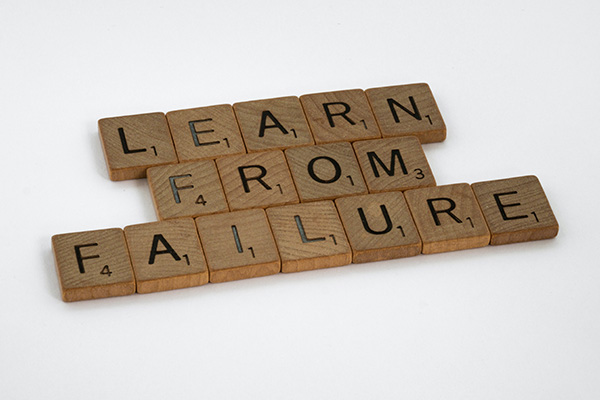
As we age, those inaction regrets pile up. The reason for that is that in some ways action regrets can be more intense. I have so many people who regret bullying kids in school. I also have heard many stories of people who bully kids in schools, and 10 years later or 20 years later, they felt terrible about that. They found the person they bullied and apologized to try to undo that. There are certain kinds of action regrets we can undo.
It's the same thing with certain kinds of action regrets. We can do what I call “at least” them. We can find the silver lining. Again, looking at this incredible trove of regrets, not all women have this regret, but the number of people who have this regret are all women. It is, “I so regret marrying that idiot, but at least I have these two great kids.” They look for the silver lining in that. Inaction regrets are less intense. You can't undo them, but you can at least them, so they linger, stick, or gnaw.
There have been times when someone will ask me, “What's your favorite mistake?” I don't want to sound flippant, I mean it. I took one job coming out of grad school that wasn't the right job for me long term but at least, I met my wife working there. There was a silver lining there.
That's okay.
That's not a regret. I would say that was a mistake in taking that job, but I don't regret it because of the at least and the positive.
It's an action regret, “I did this, but I'm going to take the sting out of it because I got this great at least out of it.” With inaction regrets, they linger. What you see both in my research and in the academic research is that inaction regrets outnumber action regrets, but there is an age difference there.
You talk about things where people try to fix an action regret. Inaction regrets stick with you. It's something I think about fairly often when I was at a party maybe before the pandemic. Somebody made a comment that I thought was inappropriate toward a group of people, and I froze. I was so dumbfounded to hear a homophobic comment. It was from an older person. That doesn't make it okay. I regret not being quick enough on my feet to know what or how to say to address that. In thinking about that regret, I would like to think I'm better prepared if that happens again in the future. Is anything from your research dealing with an inaction regret like that? I feel bad for not standing up.
You are not alone. There are so many regrets out there of people who say, “I wish I had spoken up. I wish I had said something.” Forgive me for being so literal about this database of regrets, but I can go into this database and search for the phrase spoken up and we’ll have so many of those. It's partly a boldness regret. Sometimes it's a moral regret too. The real question is what do you do with that? There is some very good research on this question.
One thing that is very clear is that talking about the regret or disclosing the regret is very helpful. There's a lot of research showing that there are all kinds of interesting reasons for that. One of them is that it lifts the burden. One way it lifts the burden is that it takes something that is a little bit amorphous in our heads and converts it into words. That aids in sense-making because the words are less fearsome than these amorphous thoughts. Even writing about it can defang that.
[bctt tweet=”Talking about the regret, disclosing the regret, is very helpful.” via=”no”]
One thing that you should do is to reveal and disclose it. One reason that we're loath to disclose or uncomfortable talking about our vulnerabilities is that we think people will think less of us as a consequence. What the evidence shows is that is wrong. People think more of us. They admire our candor. They empathize with us. They admire our courage.
[bctt tweet=”We’re uncomfortable talking about our vulnerabilities. We think people will think less of us. The evidence shows that is wrong. People think more of us; they admire our candor. They empathize with us. They admire our courage.” via=”no”]
Your regret there that you disclosed, my hunch is that most people are not going to say, “You're such a wimp. What's wrong with you?” They're going to say, “I empathize with that. I admire that you thought that.” Disclosure is one thing. Another aspect of it is something called self-compassion, which sounds a little touchy-feely. You can take a regret like that and say, “I did that but that's okay. I'm awesome. I'm the greatest.” You can boost your self-esteem or you can say, “I'm the worst person in the world.” You can be self-critical.
The work of Kristin Neff of Texas is about self-compassion and here's what you have to say, “Would you beat up a friend for doing that?” “No.” “Do you think you're the only person who has this regret?” “No.” “Do you think that all kinds of people in the history of the world wished they had spoken up?” “Of course, they have.” What you do is normalize and neutralize it.
Finally, what you do which is interesting is you want to extract a lesson from it. One way to extract a lesson from it is what's called self-distancing. Self-distancing is rooted in the idea that we're much better at solving other people's problems than our own. What we want to do is get some distance from that regret. The things you can do if you confront this. What would you tell your best friend to do with his regret? If you had younger people in your life, kids, mentees, or something like that, what lesson would it yield for them? You don't boost your self-esteem and rip yourself apart. You disclose it to make sense of it. You distance yourself from it to extract a lesson. That's how you deal with it. That process is extremely healthy. That's how we make sense of our regrets and use them to move forward.
People have come on this show and I prompt them to think about a favorite mistake and tell that story. We hope there's some comfort or healing that comes with that. I got a coffee mug I've been sipping on with my podcast logo here. A friend of mine, Karyn Ross, who is a guest on the show helped me develop some mantras that are printed on the backside of the mug. It sounds like this idea of self-compassion or self-care. It says here on the coffee mug and I use these as reminders for myself to be kind to myself. Nobody's perfect. We all make mistakes. The important thing is continuing to learn from our mistakes. There's a lot of self-compassion in those statements that Karyn helped me put on that mug.
This is something that I learned myself now. If you look at the research on self-esteem, we need some self-esteem. There's no question about it, but it's oversold. There are all kinds of evidence that it leads to people not trying very hard, fostering ingroups and outgroups, insidious forms of social comparison, etc. Self-criticism seems logical. There's no evidence that it's effective. It's virtue signaling to yourself. It sounds a little like Stuart Smalley and Jack Handy, but what science tells us is to treat yourself the way you treat a friend. We wouldn't tell a friend the way we talk to ourselves. “You idiot, what did you do?” We don't want to say that. We would treat them with some compassion.

When we do that to ourselves, it allows us to disclose which normalizes the regret and neutralizes it. We then can take a step back and try to derive a lesson from it. This is a process that should be normalized. It's something that we should do as a routine part of healthy living. What happened though is we tend to banish the regret by trying to ignore them or we don't know what to do, so they become debilitating.
Being open about mistakes or regrets is helpful. You shared about how revealing or expressing those makes you more liked than disliked. That's true in workplaces. There are dynamics when senior leaders in an organization admit mistakes. That cascades downhill and creates a culture where people can speak up about mistakes, so the company or the health system gets better.
I don't know if it‘s too dangerous a territory to wade into but I think of politicians. Without naming names, there are politicians who should have regrets or probably do have regrets about actions or inactions. I wonder if there's any research about politicians who express regrets. Is that a political suicide or is that harmful to their standing?
I don't know whether there's any research on that. Politics is different because it's such a hothouse environment, but my instinct would be that in a more normal scenery environment back when I was working in politics, that thing would be welcomed. It would be humanizing and authentic. Voters would respond to that. In this environment, I'm not sure. If you were to admit some regret, it would be turned into a meme and put on social media and cable television. You'd be doxed and it's just a mess, but that says more about the current political climate than it does about the values of disclosing regrets, offering some compassion to yourself, and then distancing yourself from it.
It's funny when you think back to 25 or 30 years ago. Those were kinder and gentler times in politics. It probably didn't seem like it at the time.
You joke, but I'm serious. One reason I got out and stop working in politics is because this world is somewhat cruel and deeply unkind. There's a brutality and coarseness to it that I used to admire, but now that I'm in the belly of the beast I no longer admire it. I don't want to stay in an environment where I might become like some of the people I see. I look back and I'm like, “Those are the good old days.”
Are there no regrets about leaving political circles?
No. That one, I don't have any regrets.
The most recent book is The Power of Regret: How Looking Backward Moves Us Forward. The timing of that research was pre-pandemic. Do you think the pandemic has caused people to think differently about regret? That survey is still open.
I started the research pre-pandemic. I ended up doing the surveys during the pandemic. I don't think that the pandemic itself changed the substance of people's regrets. What it did though is that it might have made people more reflective than they would have been in other circumstances. Through dumb luck, it might have been a good time to talk to people about this because their lives had slowed down a little bit and they might have been in a slightly more reflective mode. The pandemic did come up in the responses that people gave. Things like, “My uncle died of COVID. I never got a chance to say goodbye. My grandmother died of COVID. She had called me the day before and I was too busy and I didn't call her back.”
There's regret that unfortunately, too many people have had. It leads to the question of do we learn from regrets expressed by others. We see the story of too many of these in the news of the sad deathbed regret confessional of somebody saying, “I regret not being vaccinated. Look what happened to me. Don't let this happen to you.” Is that impactful toward those who might end up having that same regret?
My guess would be that it is. One of the things that you see is that when you get to a point in your life where you can't do anything about regret, one thing that people naturally do is try to transmit that lesson to other people.
That comes back maybe to that self-compassion or the lifting of the burden or some of the benefits that might soothe somebody while they're in the hospital and hopefully, recovering after they express the regret. Hopefully, it influences others and there are fewer regrets like that. I played around with WorldRegretSurvey.com. I recommend people to go there. You can click through the state-by-state to see what people are putting in.
The most recent regrets were contributed from Louisiana and other countries too. We have submissions from 105 countries.
When I looked the other day, Georgia and New Hampshire didn't have any entries.
I got to check that out, but that's a glitch on our end.
It may have been a user error on my part. I was wondering if New Hampshire's slogan is now going to be, “Live free without regret.”
No, I don't think so. I'm certain we have them from all 50 states.
I regret bringing that up because that could have been my fault. You can go look into that. It is a cool website too. You can click through by country or even by US state and think about your own regrets. I look forward to the book reaching my desk. It was released on February 1st. I'm going to dig in and see what else I can learn. Dan, I learned a lot from you here. I appreciate you sharing and giving us a bit of a preview of the book.
Mark, it's a pleasure. Thanks for having me.
You can go to DanPink.com. I do recommend going through Dan's back catalog. The book Drive has been incredibly impactful for me. That's a book I hear people talk about and reference a lot. Go check that out. Learn about motivation. Twenty years ago, Free Agent Nation, was pretty a prescient book. Does that seem to hold up? I read that a long time ago and I've now been a free agent for a while.
Going back to my political days, I was a little bit ahead of the voters on that one. In 2001, I'm saying that there are going to be a lot of people who are going to be self-employed and working from home. People said I was nuts.
You're ahead of the curve. Maybe likewise here on The Power of Regret: How Looking Backward Moves Us Forward. Dan, thank you for being here.
It's a pleasure, Mark. Thanks for having me.
Thanks to Dan for being such a great guest. If you want to go check out his new book available now, go to MarkGraban.com/Mistake137. As always, I want to thank you for tuning in. I hope this show inspires you to reflect on your own mistakes, and how you can learn from them, or turn them into a positive. I've had people tell me they started being more open and honest about mistakes in their work. They're trying to create a workplace culture where it's safe to speak up about problems because that leads to more improvement and better business results. If you have feedback or a story to share, you can email me at MyFavoriteMistakePodcast@Gmail.com. Our website is MyFavoriteMistakePodcast.com.
Important Links
- Interview – Past Episode with Dan Pink
- Drive: The Surprising Truth About What Motivates Us
- The Power of Regret: How Looking Backward Moves Us Forward
- DanPink.com
- Kristin Neff
- Karyn Ross – Past Episode
- WorldRegretSurvey.com
- Free Agent Nation
- MarkGraban.com/Mistake137
- MyFavoriteMistakePodcast@Gmail.com

